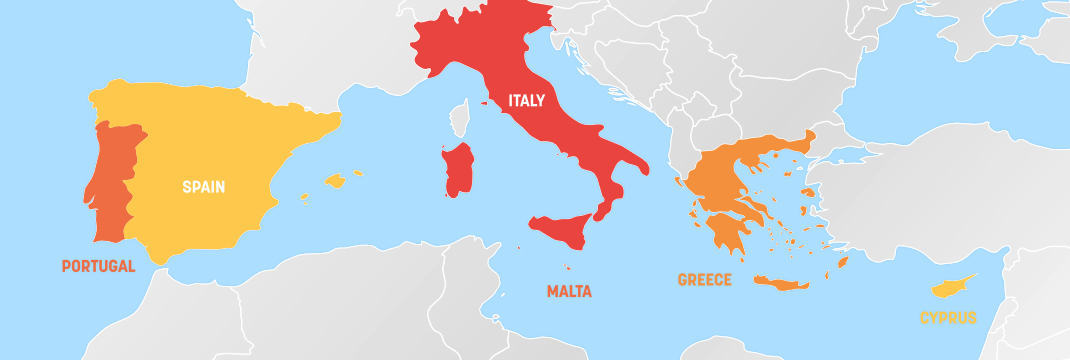
Question #1
Southern European countries are vulnerable to the strengthening of the euro mainly because of the type of products they produce. These states export low-tech manufactured goods like toys, footwear, and textiles. They, however, face direct competition in the market from the same products made in China that are cheaper. Northern European countries, in their turn, manufacture products that cannot be substituted with cheaper ones from China. Southern European nations trade with the euro as the main currency; this means that an appreciation of the euro will make buyers incur more expenses to buy the currency in a bid to trade with other countries. Additionally, it will cost more for the states to convert their currencies to fit the medium of exchange in the market. Combination of the two processes makes the products from these countries more expensive as opposed to those manufactured in China the system of which is pegged (Allegret and Sallenave 150). Looking at the forces of demand and supply, people will likely go for cheaper alternative goods as opposed to the same expensive ones. Another aspect that makes these countries vulnerable is that they are competing against the pegged system of economy. Unlike European economies, China is able to control the fluctuations of the yuan in the market while southern European nations remain affected by the forces of demand and supply.
Question #2
High inflation rates in southern European nations increase the production costs of the products. This means that the prices of the goods will grow in the market. These countries are compelled to increase the prices of their products to cover the production costs. If they do not raise the prices they will be forced to operate below the equilibrium hence making losses and in the long run, get out of the market. Inflation reduces savings and lowers the purchasing power of money. With high levels of inflation, these countries are compelled to use more of their money to purchase the euro or other standard operating currencies across the world in a bid to trade effectively. This means that they incur more costs due to exchange rate expenses and the additional impact that accrues from inflation. Inflation affects foreign capital investments negatively because investors feel that they cannot ascertain returns on their investments. Looking at southern European countries, it is evident that investors drifted their production to states like China that enjoy a controlled economy (Fornari et al. 612).
Question #3
German exports would be less sensitive to the strong euro. This can be explained by the fact that, unlike the Southern nations that compete with low tech cheap products from China, Germany manufactures high tech goods and its major competitors are the northern countries like the US that are equally affected with the same currency. A common currency (euro) reduces the transaction costs for both the consumers and the companies in European nations. With the euro companies and consumers based in Germany are able to save on currency conversions and transfers between different currency areas. Another aspect that arises is that the common currency increases price transparency. This means that all the member states will likely appraise their products equally because of the impact of the same currency in place. Price wars between the member nations will not be that intensive as each country will strive to ensure that it makes profits (Meng 230). It is due to the fact that a number of high-tech producing nations are northern European states that offer capital-intensive products. This is despite the existence of other smaller players in the economy the impact of which will not be that big. Generally, transparency and sharing of the common currency mean that German exports will be less sensitive to the strong euro.
You may find this article Questions and Answers Writing Service useful.
Question #4
Italy is the third-largest economy in Europe. In fact, the ‘made in Italy’ phrase ranks third after the Coca-Cola and Visa phrases. Among the dominant sectors in which the country has invested include fashion and food industries. Their level of development makes Italy the largest exporter of food and fashion products in Europe. 59% of its exports go to Europe to such countries as Germany, France, UK, Switzerland, and Spain as well as to the US. It is important to note that all these European states are located within the same currency zone (euro) making it easy to trade. This majorly explains why Italy-based companies never experienced any shortfalls in demand. Trading with the states with the same currency is a benefit that Italy enjoys in the mentioned sectors garnering a better portion of the global markets. Generally, Italy-based companies experienced minimal or no competition due to the euro currency strengths. Thanks to the limited price wars in the market, Italian companies were able to supply their goods to the major trading partners on the globe, which are mainly located within the Eurozone (Wang 75).
Question #5
In a bid to prevent the price wars caused by the US, China pegged its yuan to the US dollar. This means that China was able to stop the continued appreciation of the exchange rates that would have otherwise made its products more expensive as compared to those of the competitors, in this case, southern European nations. China has a huge amount of foreign-exchange reserves to defend its yuan. This means that during the appreciation in 2010 People’s Bank of China (the Chinese central bank) was able to curb the continued appreciation of the currency in relation to the US dollar by the initiation of the pegged or, in other words, managed the system. Through this system, the Chinese central bank was able to prevent the probability of the increase in prices of its products. Generally, the pegged system adopted by the Chinese does not follow the law of demand and supply. The mentioned law implies that the costs of production brought about with the appreciation of currency lead to an increase in price, which, in its turn, causes a decrease in demand. Low demand, on the other hand, will lead to low supply. This is what was expected under a normal economy controlled with the forces of demand and supply. However, this was not the case for the Chinese system as in 2010 (Allegret and Sallenave 160). Looking at southern European economies, it is evident that they are controlled by the market forces. This makes their products face stiff competition from the cheaper Chinese goods as the country enjoys cheap labor.



